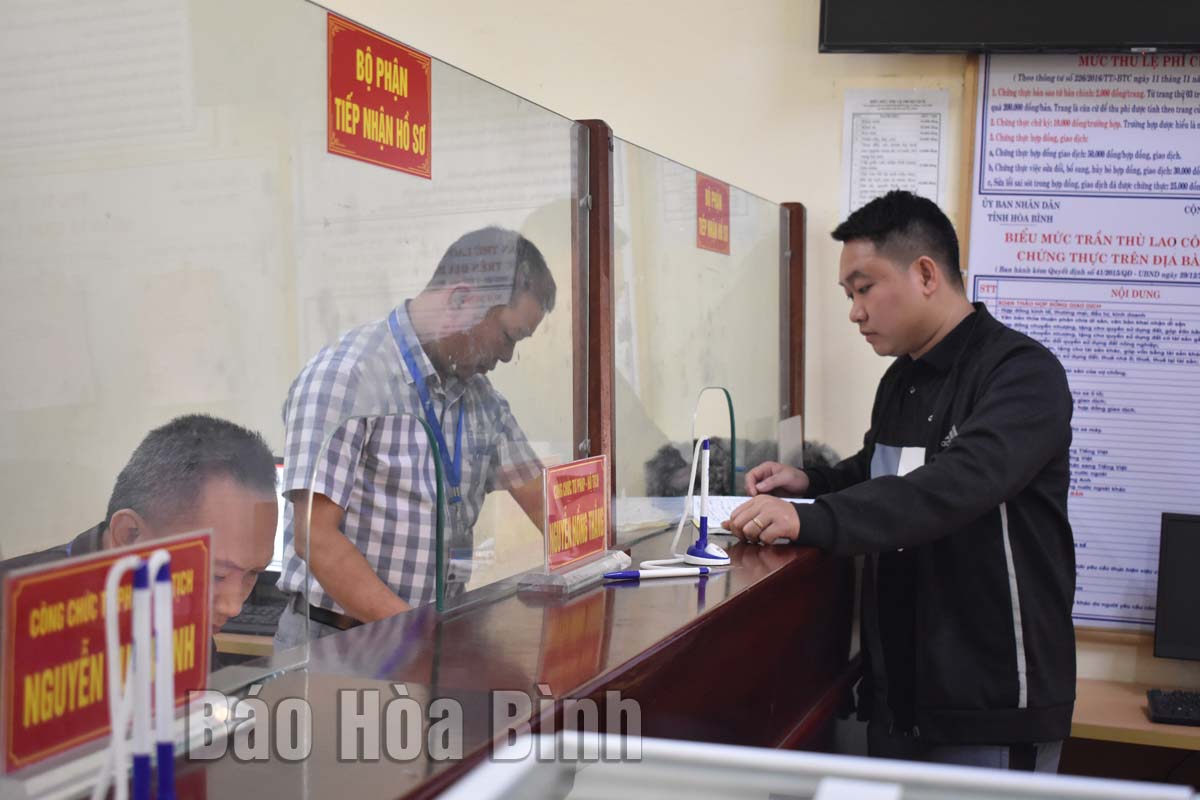
(HBO) - Kim Boi district of Hoa Binh province is implementing concerted solutions to raise the administrative reform index towards the goal of providing maximum support for businesses and people to access administrative procedures, thus contributing to socio-economic development.

Staff at the one-stop-shop unit of Bo town (Kim Boi
district) guide local residents to conduct administrative procedures.
Communes in Kim Boi district have focused on reforming
administrative procedures towards the satisfaction of local people and
businesses. The district People's Committee previously issued a plan on
administrative reform for 2022 with 40 tasks covering seven areas. The sense of
responsibility and attitude of officials, civil servants and public employees,
and the leadership and direction capacity of the Party committees and
administrations have been improved.
In the first nine months of 2022, the implementation of the
one-stop-shop mechanism at state administrative agencies continues to be
maintained in 17 communes and towns, contributing positively to administrative
reform. At present, 100% of administrative procedures are handled on the
website, and publicly posted at the People's Committees of the district,
communes and towns. The district's unit of receiving dossiers and returning results
always creates favourable conditions for individuals and organisations to
easily research, approach and implement administrative procedures.
Bui Van Diep, Chairman of the district People's Committee,
said that Kim Boi is seeing great opportunities for development when it is
planned to be the province’s key area for tourism, urban and ecological
development, with many investment projects. Therefore, the requirements for
administrative reform tasks are very high. The district People's Committee
focuses on directing, thoroughly grasping and strictly implementing guidelines
and policies of the government and the province on enhancing the responsibility
of heads of agencies in administrative reform.
In addition, the district has effectively implemented the tasks
of controlling, reviewing and simplifying administrative procedures as planned;
while maintaining and improving the quality and efficiency of operations of the
one-stop-shop units at the district and commune levels./.
Hoa Binh province is undergoing a dynamic transformation amid Vietnam’s national digital transition. Building on Poliburo’s Resolution No. 57-NQ/TW on breakthroughs in science, technology, innovation, and national digital transformation, the province has rolled out a wide range of practical action plans. A standout initiative is the "Digital Literacy for All” movement, an effort to ensure that no one is left behind in the digital era.
Hoa Binh province is undergoing a dynamic transformation in the wake of the national digital transformation movement. Building on Resolution No. 57-NQ/TW of the Politburo on breakthroughs in science, technology, innovation, and national digital transformation, the province has implemented a wide range of practical action plans. A standout initiative is the "Digital Literacy for All” movement ambitious effort to ensure that no one is left behind in the digital age.
With a spirit of unity and proactive problem-solving, the Party Committee, the government and the people of Dong Lai Commune (Tan Lac District) have made great strides in implementing the resolutions of the 24th Party Congress of the commune for the 2020 - 2025 term. Focusing on leadership and practical actions, the commune has brought the Party’s resolutions into daily life, creating strong impacts and pushing the local development forward.
Amid the nationwide push for digital transformation, young people in Hoa Binh Province are stepping up as dynamic pioneers, applying technology to enhance Youth Union operations and expand the reach of youth-led initiatives. Through creativity and adaptability, Youth Union organizations at all levels have introduced a series of practical solutions, contributing to modern governance and community development.
In recent years, An Nghia commune, located in Lac Son district, has stepped up administrative reform, focusing on improving the quality and efficiency of its single-window service unit for receiving and processing administrative procedures. These improvements have helped create favourable conditions for local residents and organisations to handle administrative procedures, contributing to the commune’s broader socio-economic development.
The Prime Minister-approved master plan to develop the multi-use value of forests ecosystems through 2030, with a vision to 2050, aims to improve the management and sustainable use of forest resources, create jobs, increase incomes, and improve the living standards of ethnic minorities, people in mountainous and remote areas, forest workers and those living near forests.



